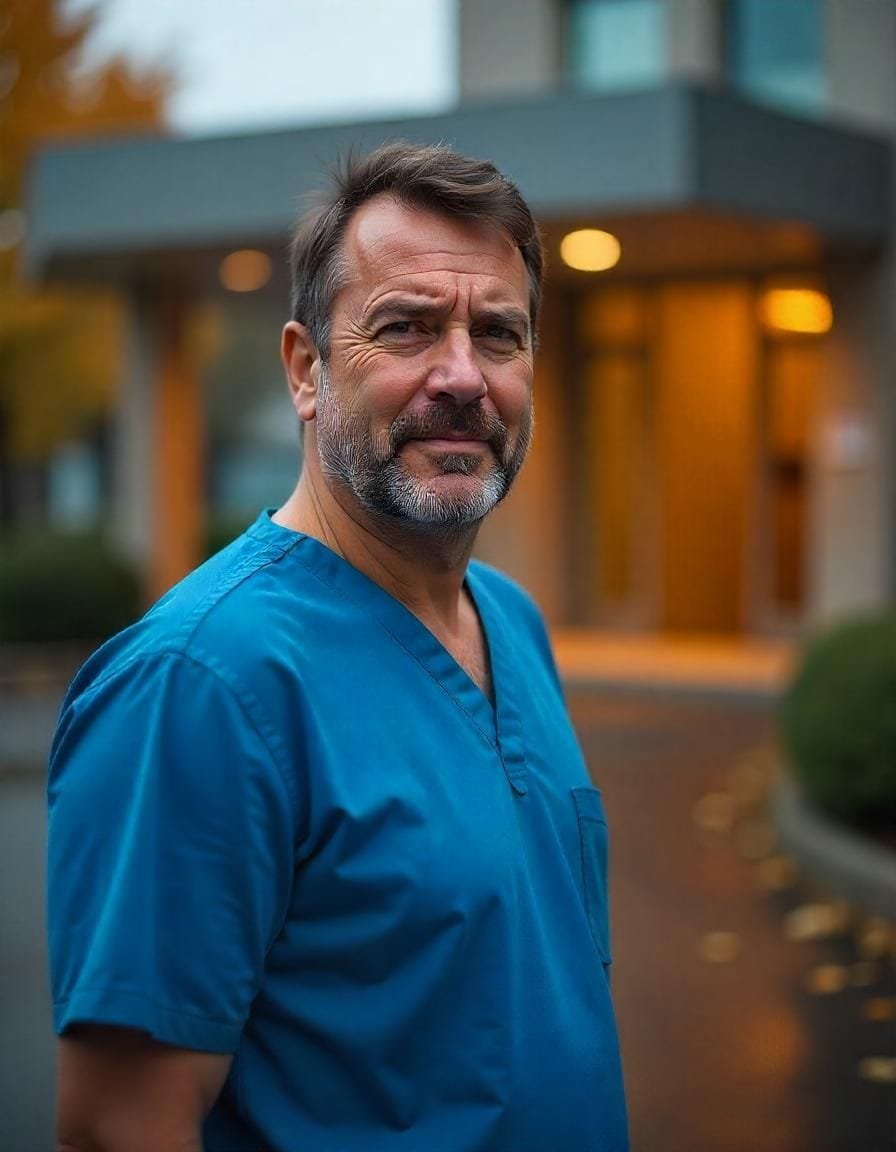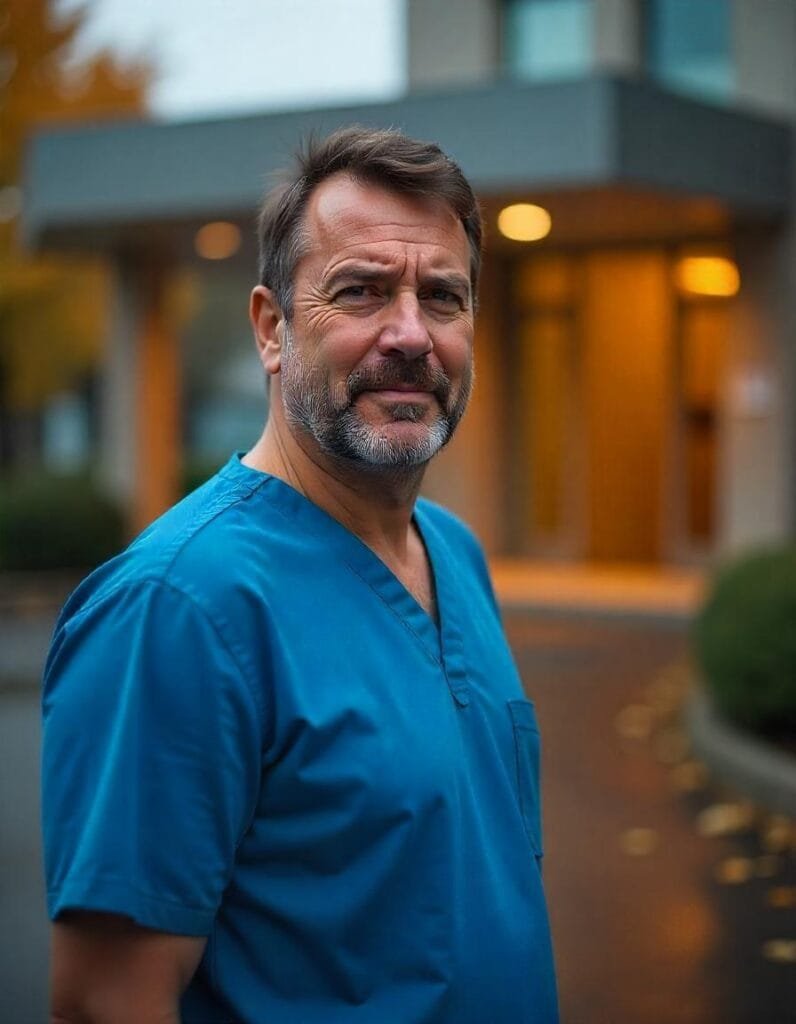My husband said he was a doctor at a hospital, but one phone call revealed the truth and changed my life forever.

I trusted my husband completely. I never questioned his long hours at the hospital. I never doubted his words… until one night, when a simple mistake shattered everything I thought I knew about him.
I always loved hearing him talk. The way his eyes lit up when he spoke about medicine, the calm authority in his voice—serene, comforting—the voice of a man who had dedicated his life to healing others.
It was one of the first things I fell in love with: how he could turn even the most complex medical jargon into something captivating. Dr. Nathan, my husband of eight years, the man who had saved so many lives.
And in many ways, he had saved mine too.

For the past six months, he told me he was working at a new hospital. It made sense. Doctors move for better opportunities, more hours, greater fulfillment. That was all I needed to know. I trusted him.
But trust is fragile. You don’t realize it’s cracking until you hear the first snap.
It happened at his parents’ house. A warm afternoon, the smell of his mother’s famous roast filling the air. The table was full of family—laughter, clinking glasses, the easy comfort of familiar company. Nathan’s hand rested on my thigh, casual and comforting.
Then his niece, Allison, spoke.
—”Uncle Nate, I was hoping to see you at work, but I never do! Can I visit you in the cardiology unit?”
Her tone was light. She had just graduated from nursing school and had landed a job at the same hospital Nathan claimed to work at.
Nathan didn’t flinch.
—”Oh, I move around a lot between departments. Hard to pin me down.”
Allison giggled.
—”Yeah! You must have so many patients in your unit, right?”
—”Yes, sweetheart.”
—”How many exactly?” she asked, tilting her head. “There are eighteen patient rooms there, right?”
—”Yes,” he replied.
—”Wow, Uncle! You must be stressed. Because then you’d remember… it’s actually twenty-five patient rooms, not eighteen.”
Silence.
Nathan’s fingers twitched on my thigh. The atmosphere in the room shifted—subtle, but undeniable. I saw it in how his jaw tightened, how he sipped his wine a little too casually.
Allison, unaware, continued.
—”I always run into Dr. Arnold and Dr. Jake, but they say they don’t see you either.”
Nathan smiled, but it didn’t reach his eyes.
—”Must’ve missed me.”
I looked at him, searching for the usual confidence in his face, the natural charm, the way he effortlessly commanded any room. But it wasn’t there.
Allison’s smile faded, sensing the change in the air.
—”Maybe you’re in a different wing?” she offered, voice quieter now.
Nathan gave a short laugh.
—”It’s a big hospital.”
He took another sip of wine, and this time, I saw it clearly—his fingers were trembling.
I had lived with this man for eight years. I had fallen asleep beside him, traced the lines of his face in the dark, learned to read the slightest changes in his expression before he even spoke.
I knew when he was lying. But why was he lying?
I cleared my throat.
—”Nathan,” I said softly, touching his fingers under the table, “which department did you say you’re in again?”
He turned his head just slightly. And in his eyes—I saw it.
Fear.
He opened his mouth—
—”Dessert, anyone?” his mother cut in quickly, clapping her hands a little too brightly.
Nathan exhaled slowly. I didn’t look away. Neither did he.
A week later, my dad had a cardiology appointment. Nothing serious—just a routine checkup. I sat with him in the waiting room while he filled out forms, his reading glasses slipping down his nose. I watched him, trying to hide my unease.
—”Just precaution,” he reminded me. “Dr. Patel said it’s nothing urgent.”
I forced a smile.
—”I know, Dad. I just like to be sure.”
That was the truth. I had always relied on the certainty Nathan brought into my life. Medicine was his world—and by extension, it had become part of mine.
When the nurse finally called my dad in, I sighed and reached for my phone. I just needed to hear Nathan’s voice. One quick call, a simple “Don’t worry,” and I’d feel okay.
I called. Voicemail.
I frowned and tried again. Straight to voicemail.
Texted. No response.
I checked the time. Late afternoon. He should be on break. I tried to stay calm, but I couldn’t shake the unease.
After an hour, I gave up. This wasn’t like him. If he were in surgery or with a patient, he’d at least text me back.
On impulse, I called the hospital.
A receptionist answered, her tone professional and firm.
—”Good afternoon, Lakeside Hospital. How may I help you?”
—”Hi, I’m trying to reach my husband, Dr. Nathan Carter. His phone’s off. Can you leave him a message?”
A pause.
—”Could you repeat the name?”
—”Nathan. He’s in cardiology.”
Silence again. Then the sound of typing.
Finally:
—”I’m sorry, ma’am. We don’t have a Dr. Nathan Carter on staff.”
I let out a small, confused laugh.
—”That can’t be right. He’s been working there for six months.”
More typing. Another pause.
—”No, ma’am. There’s no Dr. Carter in our system.”
I gripped the phone tighter.
—”Maybe he’s in a different department?”
—”I’ve checked them all.” Her voice remained polite, but it had finality.
I quickly thanked her and hung up. My hands were cold, despite the warm room. I opened the hospital’s website and searched their staff directory.
He wasn’t listed.
The walls around me seemed to shift, to close in. Where the hell was my husband?
I needed answers.
I drove straight to the hospital. On the way, my mind spun—maybe an admin error, a misunderstanding, something logical.
An hour later, I arrived. The lobby smelled of disinfectant and coffee. I could hear murmurs, beeping monitors, footsteps echoing through the halls.
I walked to the front desk, my voice tight but steady.
—”There has to be a mistake. I called earlier about my husband, Dr. Carter. He works here.”
The receptionist looked up, something flickering in her eyes. Before she could speak, a voice came from behind me.
—”Mrs. Carter?”
I turned to see a doctor standing a few feet away. His face was unreadable, his expression calm but serious.
—”I know your husband,” he said. “Please come with me. We need to talk in private.”
—”This must be wrong,” I muttered. “My husband—he works here. He told me. He’s a doctor.”
The doctor exhaled slowly.
I followed him down a quiet hallway. My legs felt heavy. The walls were too close, the air too thick. My thoughts raced—was Nathan fired? Was this a misunderstanding?
He led me to a small office, closed the door, and turned to face me.
—”Mrs. Carter,” he said gently, “your husband doesn’t work here… because he’s a patient.”
The words hit me like a blow.
—”No.” I shook my head. “That’s not possible.”
He sighed and laid a file on the desk. My husband’s name was on the cover.
With trembling hands, I opened it. Test results. Dates. Diagnosis.
Stage IV.
Nathan hadn’t been working late. He hadn’t been too busy to text back.
He had been fighting for his life.
I gripped the edge of the desk, tears clouding my vision. He had lied to me. Hidden this from me. And the most terrifying question of all:
How much time did he have left?
The doctor walked me down a sterile hallway. I braced myself for something senseless. Something unimaginable.
But deep down, I already knew.
He pushed open the door of a private room.
And there he was.
Nathan.
Thinner. Paler. The dark circles under his eyes deeper than I’d ever seen. He was sitting in a hospital bed, wearing a gown instead of his usual dress shirt. When our eyes met, I saw it—the guilt, the recognition. He knew I had found out.
—”I was going to tell you,” he said, voice rough.
I took a slow, shaky step forward.
—”When, Nathan?” I whispered. “After I started planning your funeral?”
His face crumpled. He ran a hand through his hair and exhaled.
—”I thought I could handle it on my own.” He spoke low. “It was just a routine checkup in November… and suddenly, I was a patient, not a doctor. I didn’t want to scare you.”
I swallowed hard.
—”You lied to me.”
—”I was trying to protect you.” His eyes shimmered. “Because I still had a good chance of surviving.”
I sat beside him and took his hand.
—”You don’t get to decide that alone.”
A small smile tugged at his lips.
—”How about this: If I make it through, I’ll never lie to you again.”
I squeezed his hand tighter.
—”You better keep that promise, Dr. Carter.”
Months later, when he finally walked out of that hospital as a survivor, he kept his promise.
And when he was offered a job—not as a patient, but as a doctor again—he looked at me with something I hadn’t seen in a long time:
Hope.





